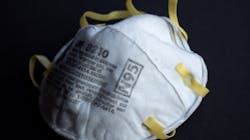Thursday Troubleshooter: How much reuse can N95s and surgical masks endure?
This column is here to guide dental professionals with advice from the experts . . . because they’ve been there. Remember, you are not alone! Send your questions to [email protected]. Those who reach out will remain anonymous if their questions are used on DentistryIQ.
QUESTION:
Our staff members are currently wearing the same N95 masks every day with surgical masks over them. Now our boss wants us to sterilize the surgical masks because he says they are too expensive. Wouldn’t sterilization of the surgical masks degrade them? Also, I overheard that the assistant is wearing the same mask for every patient.
ANSWER FROM KAREN DAW, MBA, "The OSHA Lady," consultant and speaker:
The question about whether to reuse a mask, and what to do between uses, is a common one. In fact, the last dozen offices I’ve trained via Zoom had similar questions. Without going into all of the details, the answer as to whether we can decontaminate masks is “maybe.”
As you are aware, N95 masks are considered single-use disposable filtering facepiece respirators (FFR). The Centers for Disease Control and Prevention (CDC) developed a plan to help the health-care industry conserve supplies during times of shortages, such as now. Limited FFR reuse is the practice of wearing the same N95 all day, while removing and storing it between each patient. Extended use of an FFR is when the same respirator is worn with multiple patients and not removed in between. Decontamination or storage in a paper bag for at least five days are acceptable strategies for reuse of FFRs.
There is a maximum number of times this should occur, and the CDC currently places that at five times or fewer, for example, if the manufacturer states fewer times. If fit or performance are compromised (broken straps or it cannot pass a fit test or user seal check), a mask is not to be reused. Also, if a mask becomes soiled or damaged, it is not acceptable to be donned again. Therefore, many practices cover the respirator with a surgical mask.
Now, it’s important to note that N95s are hard to come by. This is why there is an exception that permits them to be decontaminated and reused. Surgical masks, on the other hand, are not in short supply as of the date this article was published. An office may not be able to get their preferred brand or model, but the point is they can still get surgical masks in sufficient quantity so that these can be changed between patients. The Occupational Safety and Health Administration (OSHA) would not be keen to hear that personal protective equipment (PPE) is being used “off label” to save money. If we ever experience a shortage of surgical masks, we’ll cross that bridge when we come to it. We’ll need to contact manufacturers for the appropriate ways to decontaminate those company’s specific masks between uses.
OSHA’s PPE standard specifically states that after an employer conducts a hazard assessment, “Each affected employee shall demonstrate an understanding of the training specified in paragraph (f)(1) (the proper care, maintenance, useful life, and disposal of the PPE) of this section, and the ability to use PPE properly, before being allowed to perform work requiring the use of PPE.”
As you are already aware (or at least your gut was telling you), the decontamination of surgical masks for reuse, especially to save money, is not acceptable.
Now some may be asking, “But the mask is protecting the N95, so technically it is not PPE, it is a barrier!” I hear you, and I ask that you consider the following: what do we do to ensure that surfaces covered by barriers are not capable of transmitting disease? Those barriers are changed between patients! What if that surgical mask and not an N95 were covering your mucous membranes? You’d still change it because it’s now potentially contaminated. Prepandemic or postpandemic, if the item is labeled as single-use disposable and there exists no guidance that permits extended or limited reuse, then we adhere to what we know. Good luck!
To read previous Troubleshooters, visit DentistryIQ and search “Thursday Troubleshooter.” And remember! If you’re having problems in your dental practice, send your question and concerns to Troubleshooter for an expert to address. You’ll be helping others who are experiencing similar issues. Send inquiries to [email protected].
About the Author
Team Troubleshooter
This column features questions from everyday people who work in dental practices, who have issues they would like addressed by the experts. It no longer runs regularly, but the questions sent in the past still apply to dental practices today. Search "Troubleshooter" on DentistryIQ to read more.
